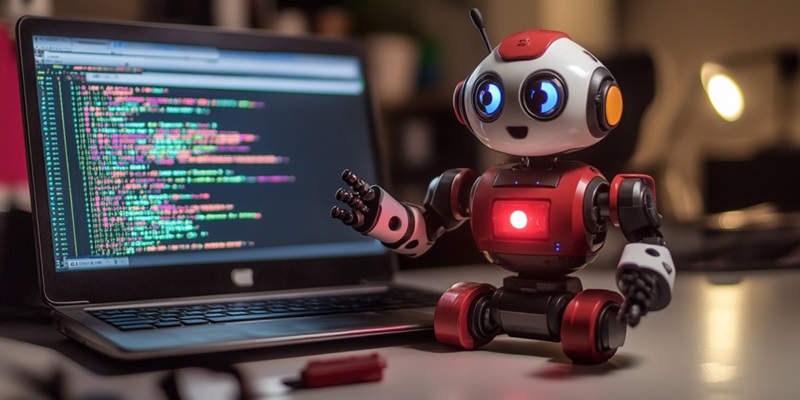In a transformative move for the tech industry, Google recently unveiled "Jules," an innovative AI coding assistant designed to autonomously identify and fix software bugs while proposing code changes. Jules, powered by the advanced Gemini 2.0 platform, integrates seamlessly with GitHub’s workflow system, streamlining the software development process with minimal human intervention.
Revolutionizing Code Debugging
Increased Efficiency Through Autonomy
Google introduced Jules at an opportune time when the software industry faces a considerable talent shortage and significant technical debt challenges. By autonomously scrutinizing complex codebases, implementing multi-file fixes, and preparing detailed pull requests, Jules aims to reduce the need for constant human oversight. This new tool anticipates playing a role in 75% of new application developments by 2028, according to a Gartner report, significantly boosting coding efficiency.
Jules stands out from other coding assistants because it doesn’t just suggest fixes but autonomously creates and executes complete repair plans within the GitHub ecosystem. This unique capability ensures that developers maintain control over the final product, requiring their explicit approval before merging any changes. This balance of automation and human oversight promises to enhance software development while maintaining quality and security.
Enhancing Developer Control and Safety
At a recent press conference, Jaclyn Konzelmann from Google Labs highlighted Jules’ thoughtful design, particularly its safety features aimed at preventing inadvertent errors. The AI tool presents proposed plans transparently, allowing developers to monitor and approve its processes. This commitment to safeguarding code integrity ensures that human developers remain an essential part of the software development loop, safeguarding against potential risks of fully autonomous decisions.
Jules is an integral part of Google’s broader vision of creating AI agents that function independently yet remain under human supervision. This approach, powered by the Gemini 2.0 language model, allows Jules to deeply understand and generate code effectively and accurately. Google’s cautious rollout of Jules underscores its recognition of AI safety and reliability concerns prevalent in the industry, reflecting a balanced approach to integrating advanced AI into critical workflows.
Implications for the Software Industry
Mitigating Development Risks
Jules has ignited discussions regarding its potential impact on developer jobs and the future of software engineering. While some may worry that greater automation could threaten employment, early testing suggests that Jules complements rather than supplants human developers. Researchers at Lawrence Berkeley National Laboratory reported significant improvements in the efficiency of certain analysis tasks, reducing them from a week to mere minutes with Jules.
This improvement in workflow efficiency suggests that Jules could decrease the financial risks typically associated with software development, such as cost overruns and diminished project value. By automating bug fixes and routine maintenance tasks, Jules helps developers focus on more complex and creative aspects of software engineering. This shift not only promises to enhance productivity but also to elevate the overall quality and innovation within development teams.
Competitive Edge in the Developer Tools Market
The launch of Jules positions Google to compete robustly against established giants like Microsoft’s GitHub Copilot and Amazon’s CodeWhisperer. The developer tools market is projected to reach a staggering $937 billion by 2027, and Google’s entry with Jules demonstrates a strategic push to capture a significant share of this lucrative market. By making Jules initially available to a select group of testers and planning broader access by early 2025, Google aims to ensure thorough testing and community feedback.
Future integrations of Jules across Google’s development ecosystem further demonstrate the company’s commitment to innovating developer tools. This ongoing integration hints at a future where Jules is not just a standalone tool but part of a comprehensive suite aimed at revolutionizing how software is developed, tested, and maintained. This long-term vision could reshape the development landscape, providing developers with more powerful and intuitive tools.
The Future of AI-Human Collaboration
Addressing Code Quality Challenges
Jules represents a significant stride toward solving some of the software industry’s most expensive issues, including poor code quality and the extensive resources required for manual debugging. By improving the efficiency and reducing costs associated with software development, Jules aims to set new standards for code quality. This focus on automation without sacrificing human oversight may lead to a paradigm shift in how companies approach development projects.
If successful, Jules could herald a new era of AI-human collaboration in software development. This collaboration promises to harness the strengths of both AI and human intelligence to create more robust, efficient, and innovative solutions than ever before. By addressing the challenges of technical debt and talent shortages, Jules not only enhances individual productivity but could also significantly impact the industry at large, driving forward the capabilities and aspirations of development teams globally.

